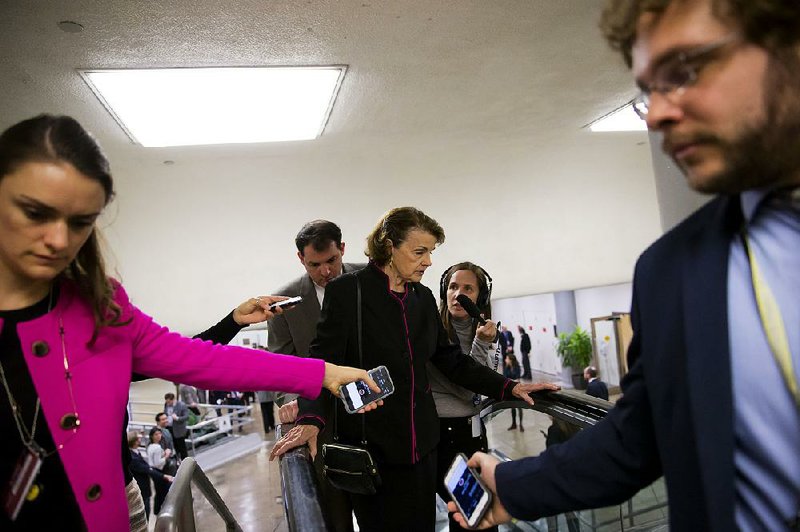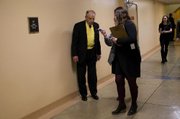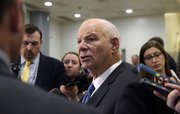WASHINGTON -- President Donald Trump said Wednesday that it "seems unlikely" that he'd give an interview in special counsel Robert Mueller's investigation into potential coordination between Russia and the Trump campaign.
Trump said "we'll see what happens" when asked if he'd provide an interview to Mueller's team.
"When they have no collusion and nobody's found any collusion at any level, it seems unlikely that you'd even have an interview," Trump said during a joint news conference with the prime minister of Norway.
Mueller's team told Trump's lawyers in December that it is likely to request an interview with the president as part of its investigation. Trump's lawyers have previously stated their determination to cooperate with requests in the probe, which has already resulted in charges against four of Trump's campaign advisers.
[DOCUMENT: Read the full transcript]
The special counsel has interviewed a number of Trump's senior aides and associates in recent months, including White House adviser Jared Kushner, who is also the president's son-in-law; former Chief of Staff Reince Priebus; communications director Hope Hicks; and White House counsel Don McGahn.
The investigation is expected to last for much of 2018, according to people with knowledge of the probe.
Trump called the investigation a "phony cloud" over his administration. "It has hurt our government," he said. "It was a Democrat hoax."
The comments come after Trump had already lashed out at the investigations on Twitter on Wednesday morning, urging Republicans to take control of the inquiries and repeating his claim that they are on a "witch hunt."
[PRESIDENT TRUMP: Timeline, appointments, executive orders + guide to actions in first year]
"There was no collusion, everybody including the Dems knows there was no collusion, & yet on and on it goes," he tweeted. "Russia & the world is laughing at the stupidity they are witnessing. Republicans should finally take control!"
In a separate tweet Wednesday morning, Trump accused Sen. Dianne Feinstein, D-Calif., of being "underhanded and a disgrace" for disclosing details of a dossier of unsubstantiated allegations about his ties to Russia during the presidential campaign.
A day earlier, Feinstein, who faces a primary challenge in her re-election this year, released the transcript of the Senate Judiciary Committee's private August interview with an official from the political opposition research firm Fusion GPS, which commissioned the dossier.
She released the transcript of Glenn Simpson's interview over the objections of the committee's Republican chairman Sen. Charles Grassley of Iowa. She is the top Democrat on the panel.
"The fact that Sneaky Dianne Feinstein, who has on numerous occasions stated that collusion between Trump/Russia has not been found, would release testimony in such an underhanded and possibly illegal way, totally without authorization, is a disgrace," Trump tweeted. "Must have tough Primary!"
The material wasn't classified, and Feinstein said Wednesday that she didn't do anything illegal. And as the top Democrat on the committee, she didn't need authorization from Grassley to release it. Her staff helped conduct the interview with Simpson, who also had asked for the interview to be released.
Still, the release was a blow to the two lawmakers' earlier attempts at bipartisanship on the committee's Russia investigation. Feinstein told reporters that she didn't tell Grassley beforehand, and "I owe him an apology and I will give him an apology as soon as I see him."
Grassley said in a news release Tuesday that he was "confounded" by the release and argued that it could undermine attempts to get additional witnesses. By Wednesday he appeared to have softened, saying he was continuing to negotiate witnesses with Feinstein in the Russia probe.
"Listen, I screw up regularly and she doesn't owe me an apology," Grassley said.
Trump has derided the dossier as a politically motivated hit job. Following his lead, several GOP-led committees are now investigating whether the dossier formed the basis for the FBI's initial investigations. That has angered Democrats, who say those claims are distractions from the Russia investigations.
In a statement accompanying the release of the transcript, Feinstein said she was trying to set the record straight after speculation about the interview.
Feinstein also sits on the Senate Intelligence Committee, which is conducting its own investigation into the Russian interference and whether Trump's campaign was in any way involved.
Trump has often invoked Feinstein on the collusion issue. She said on CBS' Face the Nation on Oct. 8 that there's "no proof" yet that there was any collusion between Russia and Trump's campaign, adding: "I think that proof will likely come with Mr. Mueller's investigation."
Feinstein faces a primary challenge from California state Senate leader Kevin de Leon. Asked about Trump's tweet, she brushed off the idea that the release had anything to do with her election.
"Oh, come on," she said. "Of course not."
Sen. Mark Warner of Virginia, the top Democrat on the Senate Intelligence Committee, criticized Trump's tweet, saying it "smacks of interference in investigations, and I think that's inappropriate."
Trump had an exchange with Feinstein over immigration during a meeting Tuesday with congressional leaders at the White House.
During the part of the meeting open to news cameras, Trump appeared to agree with her on making a deal on the Deferred Action for Childhood Arrivals program -- which provides guarantees to illegal aliens who were brought to the U.S. as children -- without other requirements that he and congressional Republicans have sought, including money to build a wall on the Mexican border. House Majority Leader Kevin McCarthy, R-Calif., interrupted the president to try to steer him back on course.
The White House left the exchange out of an official transcript Tuesday but corrected it Wednesday morning after being asked about it.
Also Wednesday, Deputy Attorney General Rod Rosenstein, who appointed Mueller, and FBI Director Christopher Wray were on Capitol Hill to speak to Warner and the Republican chairman of the Senate intelligence panel, Sen. Richard Burr of North Carolina. Neither senator would comment on the meeting's purpose.
EUROPEAN MEDDLING
Separately, a new report by Senate Democrats warns of deepening Russian interference throughout Europe and concludes that even as some Western democracies have responded with aggressive countermeasures, Trump has offered no strategic plan to bolster their efforts or safeguard the U.S. from again falling victim to Kremlin meddling.
The report commissioned by the top Democrat on the Senate Foreign Relations Committee is the first from Congress to comprehensively detail Russian efforts to undermine democracies since the 2016 presidential election. It wastes no time in calling out Trump personally for what it describes as a failure to respond to Russia's mounting destabilization activities in the U.S. and worldwide.
The report was obtained by The Associated Press in advance of its public release Wednesday.
"Never before has a U.S. president so clearly ignored such a grave and growing threat to U.S. national security," warns the report, which was released by Sen. Ben Cardin, D-Md.
Sen. Bob Corker, the Republican chairman of the committee, didn't sign on to the report, which recounts Russian operations in 19 European nations.
Cardin said the roughly 200-page report is built on Republican and Democratic ideas and that he commissioned it to show Americans the scope of efforts by Russian President Vladimir Putin to undermine democracy.
"We knew after the 2016 elections that we were vulnerable, but the 2016 elections were just a small part of Russia's overall design, Mr. Putin's design to try to compromise democratic institutions," Cardin said on the report's public release at The German Marshall Fund of the United States, a Washington-based think tank focused on European and North American cooperation.
Cardin's inquiry places blame directly on Putin for a "relentless assault to undermine democracy and the rule of law in Europe and the United States."
Concerned that Trump has failed to identify Russian aggression as a national rallying point, the report urges a "stronger congressional voice" in pro-democracy efforts and funding. The report calls for committee hearings and other bipartisan efforts to aid European nations in countering Russian aggression.
Information for this article was contributed by Mary Clare Jalonick, Catherine Lucey, Ken Thomas, Jonathan Lemire, David Pitt, Chad Day, Stephen Braun, Eric Tucker and Deb Reichmann of The Associated Press; and by Josh Dawsey and Philip Rucke of The Washington Post.
A Section on 01/11/2018



